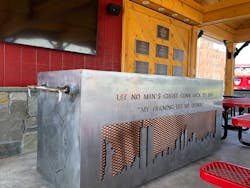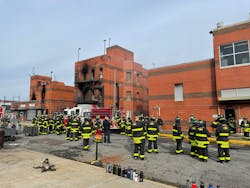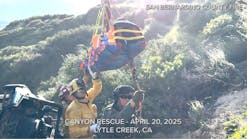Fire Service Cornerstones of Success: Training and Teamwork
Recent events highlight the tremendous dedication and commitment of the members of FDNY. Several high-profile incidents that occurred around the city challenged them and required tactical flexibility by both officers and firefighters alike. In each case, the department rose to the occasion to save lives and property.
Without question, FDNY’s greatest asset is a critically thinking, knowledgeable, well-trained, physically fit and healthy firefighter.
Deep roots
FDNY’s success is nothing new. Time and time again, the department has exhibited this. However, FDNY didn’t suddenly wake up one day and become good at what it does. Its performance is the result of a continual drive to improve and to never be satisfied with the status quo. A highly reliable organization always pays attention, looks for patterns, and tracks small failures and trends. It’s decades of dedication to predict, prevent and prepare for the possible. It’s about the cornerstones of success: training and teamwork.
No one fire or incident ever should define an individual or a department. It’s the years, and perhaps decades, of training and preparation that contribute to success on the fireground. Every day is a training day.
The saying, “Let no man’s ghost come back to say, ‘My training let me down,’” is inscribed in several places around FDNY Fire Academy. It serves as a continuous reminder to all firefighters of the importance of training.
Recently, during a conversation with several retired members, those individuals commented on how well-trained and dedicated FDNY members are. I immediately replied that the success and dedication that’s seen on the fireground today is a credit to the members who came before, who set the standard for commitment to preparation, training and teamwork. The long-term success of the organization is decades in the making and never complete.
“Leave the job better than you found it.” This often-used line is exemplified by so many who were and are in the FDNY family. Indeed, generations of FDNY members leave the job better than they found it.Experiences are transferable
FDNY plays to win on every run of every tour. This winning mindset entails many small tactical nuances that are executed proficiently to position members to achieve the greatest possible outcome. Similar to the focus of a head coach of a winning football team, firefighters always must look to gain a competitive advantage before the “game”—the tour in the firehouse. Everyday training provides this tactical advantage.
To a great degree, experiences are transferable, which means that the more that you read, do or see, the better prepared that you likely are to be. Fire stories are learning opportunities and provide a valuable opportunity to be better. Many times, I operated at or commanded an incident that wasn’t well-defined in standard operating procedures. Often, I recalled an article, training class or fire story that better prepared me for the incident, giving me operational flexibility and enabling me to operate in the gray areas where procedures might not prepare one adequately for unusual or uncommon incidents. It’s about attending training and, as I like to say, staying learnable regardless of the time that you have on the job.
Teamwork entrenched
It isn’t just training that breeds decades of success. The other key ingredient is teamwork. In baseball, the pitcher who throws a complete game shutout doesn’t win if his teammates don’t score runs to support him. The sacrifice bunt to get a runner into scoring position or the starter who throws out of the bullpen in relief exemplify team over individual. Exceptional teamwork accounts for success.
Likewise, it’s exceptional teamwork that makes FDNY successful. Teamwork long has been ingrained in FDNY culture. A new firefighter, the probie, starts learning about teamwork on Day One at the fire academy. It doesn’t need to be spoken. It’s evident in the way that instructors conduct training as well as in the firefighting procedures that new firefighters are taught.
Soon after probies complete training at the fire academy and arrive at the firehouse, they begin to see teamwork in action. Around the firehouse, training, housecleaning duties and even preparation of the firehouse meal are performed as a team.
When an alarm is received, the meaning of teamwork takes on a greater significance, because lives now might be at stake. Teamwork is critical on the fireground, because firefighters must trust and rely on one another to execute their assigned duties. The hose team’s failure to position the hoseline in the correct location can cause injury or death to the firefighters who are assigned to search the structure for victims who were overcome by smoke from the fire. A firefighter who prematurely vents a window before the hoseline is in place can create a dangerous environment for other members.
Just as in baseball, everyone has a position to play and an assignment to execute for the team to be successful. Whether you’re a baseball player who’s in the clubhouse or on the ballfield, or whether you’re a firefighter who’s in the firehouse or out battling a fire, it’s critical to understand the importance of teamwork and the ingredients that are necessary to facilitate a winning team.
Both teamwork and training are woven into the fabric of FDNY firefighters. Success begins long before the alarm comes in or the tones go off.
“Let no man’s ghost come back to say, ‘My training let me down’” has several valuable meanings. It means being there for your fellow firefighter, being a reliable teammate, being well-trained and being passionate about the job. For civilians, it’s an understanding that firefighters will come for them, always, and that those who come for them are prepared.
‘Left of the boom’
Decades ago, the intelligence community coined the term “left of the boom,” which describes the timeline from left to right: preparation, incident, response.
Left of the boom is the offensive preparatory measures that are in place before an incident—or before the bomb explodes. Conversely, “right of the boom” describes the immediate response to an incident. The “boom” is, of course, the incident itself. In the fire service, right of the boom is when the tones go off and the training commitment from left of the boom is tested.
FDNY is a family as well as a team. All members have a responsibility to their brothers and sisters and to those who they protect. Members’ dedication to prepare from the “left of the boom” and to have the skills that are necessary to respond “right of the boom” is the key to incident preparation.
Certainly, there will be times when, despite best efforts, the results won’t match the intensity, dedication, training and absolute team effort of FDNY’s members. However, it won’t be from a lack of preparation. Yes, a dedication to training and teamwork enables FDNY members to perform with a high level of proficiency, skill level and tactical flexibility, but the department’s procedures can’t possibly account for every situation.
FDNY procedures fundamentally value teamwork over individual performance. It’s the team concept that allows each individual, as part of the team, to fully execute that person’s assignments and to save lives. Knowing that others are equally dedicated and trained and understand the function of the team has saved countless lives in New York City.
Dedication to preparation
In short, it’s about preparation—both in teamwork and in training. Both begin long before the tones drop—having a winning mindset, playing to win and executing on the fireground. The time to train is now, before the “boom.” The hour that you dedicate to training pays great dividends on the fireground, on game day, because on game day, the time for preparation is passed.
Does your department or organization have the same commitment to teamwork and training that FDNY has?

Frank Leeb
Frank Leeb is the managing director of the First Responder Center for Excellence. He previously served as a deputy assistant chief in FDNY, retiring in June 2024 after more than 31 years. During his tenure with FDNY, Leeb held several senior staff positions, including chief of the fire academy, chief of training and chief of safety. He also has been a member of the East Farmingdale, NY, Volunteer Fire Department since 1983. Leeb holds a bachelor's degree in fire service administration from SUNY Empire State and a master’s degree in security studies from the Naval Postgraduate School, Center for Homeland Defense and Security. He served as an advisory panel member for UL's Fire Safety Research Institute's "Study of Coordinated Fire Attack Utilizing Acquired Structures" and was the keynote speaker for Firehouse Expo in 2022 and FireFusion 2024. Leeb is the author of "Cornerstones of Leadership: On and Off the Fireground." He was a presenter at the 2022 and 2023 U.S. Fire Administrator Summit on Fire Prevention and Control. Leeb can be contacted at [email protected].







